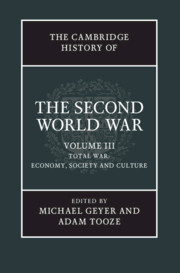Book contents
- The cambridge history of THE SECOND WORLD WAR
- The Cambridge History of the Second World War
- The Cambridge History of the Second World War
- Copyright page
- Contents
- Illustrations
- Figure
- Map
- Tables
- Contributors to volume III
- Introduction to volume III
- Part I Political Economy
- Part II The Social Practice of Peoples’ War, 1939–1945
- Introduction to Part II
- 9 Death and survival in the Second World War
- 10 Wars of displacement
- 11 The war of the cities
- 12 Battles for morale
- 13 Hors de combat
- 14 The war of the villages
- Part III The Moral Economy of War and Peace
- Part IV In the Aftermath of Catastrophic Destruction
- Bibliographical essays
- Index
- Book part
10 - Wars of displacement
Exile and uprooting in the 1940s
from Part II - The Social Practice of Peoples’ War, 1939–1945
Published online by Cambridge University Press: 05 June 2015
- The cambridge history of THE SECOND WORLD WAR
- The Cambridge History of the Second World War
- The Cambridge History of the Second World War
- Copyright page
- Contents
- Illustrations
- Figure
- Map
- Tables
- Contributors to volume III
- Introduction to volume III
- Part I Political Economy
- Part II The Social Practice of Peoples’ War, 1939–1945
- Introduction to Part II
- 9 Death and survival in the Second World War
- 10 Wars of displacement
- 11 The war of the cities
- 12 Battles for morale
- 13 Hors de combat
- 14 The war of the villages
- Part III The Moral Economy of War and Peace
- Part IV In the Aftermath of Catastrophic Destruction
- Bibliographical essays
- Index
- Book part
Summary
Keywords
- Type
- Chapter
- Information
- The Cambridge History of the Second World War , pp. 277 - 297Publisher: Cambridge University PressPrint publication year: 2015

